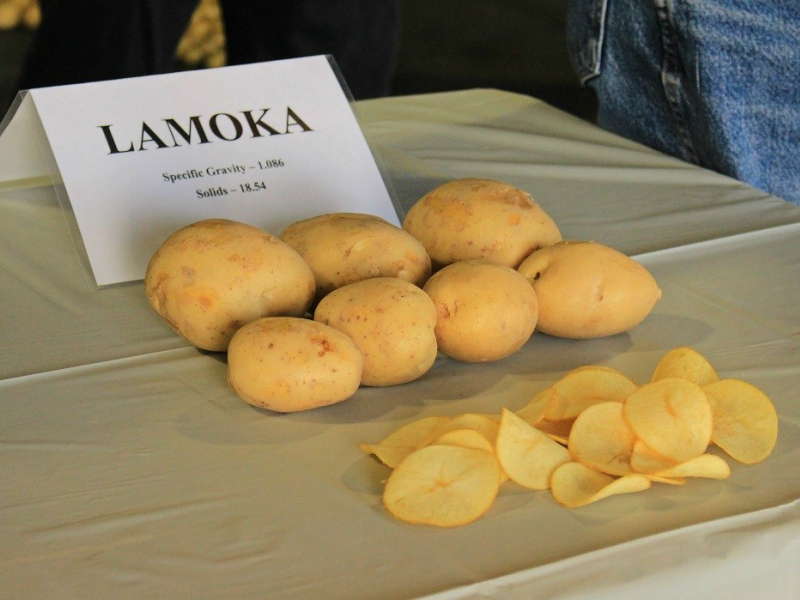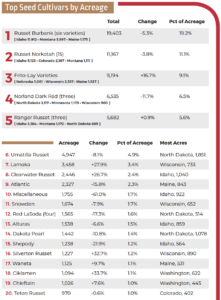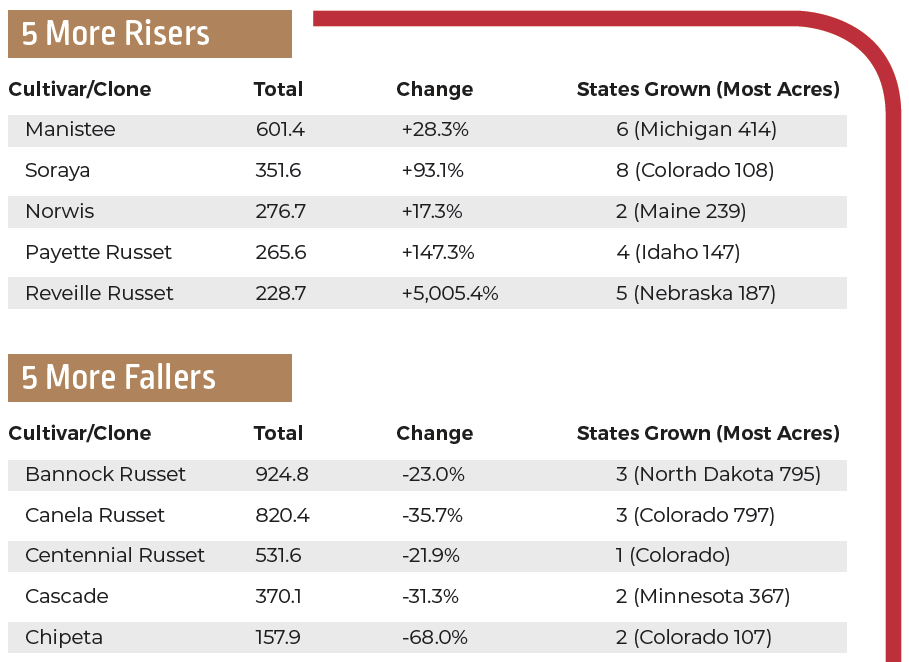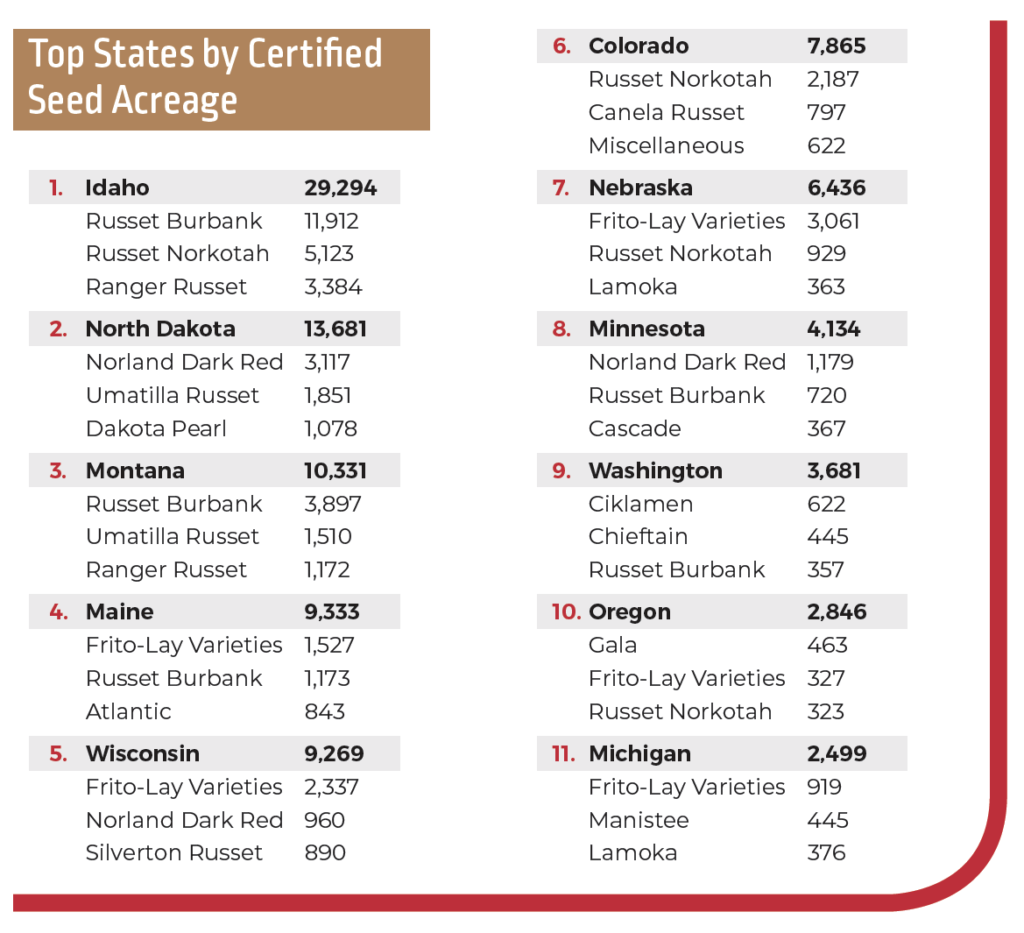
Seed Acreage Report: Lamoka, Clearwater continue rising
Reported certified potato seed acreage in the United States fell by 6.7 percent in 2018, with several of the top cultivars seeing a corresponding dip in total acres.
Once again, Russet Burbank was far and away the most grown variety, accounting for more than 19 percent of the total acreage, although that amount did fall by 5.3 percent.

The certified acreage report is compiled by the Colorado Potato Seed Certification Service. Manager Andrew Houser noted the way acres and varieties are counted can vary from year to year. As an example, he used Colorado, where acres reported dropped by 19 percent.
“Our seed growers reported only seed that is available for sale. In Colorado, we have different categories of seed and some seed can be sold and some can only be used for plantback by the grower,” Houser said. “Historically, we have reported all accepted certified seed, but this year I am only reporting what is available for sale.”
With a rising amount of potatoes used for processing, it’s no surprise that two varieties that were among the largest increases — Lamoka and Clearwater Russet — are widely used for chips and fries, respectively.
Lamoka acreage jumped nearly 28 percent, making it the seventh most-grown variety in the U.S.
When Cornell University breeders released Lamoka, along with Waneta, in 2011, they had an eye on the chipping market. The medium-sized white round holds up well in cold storage and continues to rise in popularity.
Lamoka has ‘raised the bar’
Similar to Snowden, Lamoka was a popular choice for spud growers in areas where Frito-Lay varieties are dominant, including Wisconsin, Maine, Michigan and Nebraska. It ranked no lower than fourth in terms of acreage among all varieties in those states.
“The variety has raised the bar in some attributes, not only agronomic performance but in chip quality and processing performance. It’s a good yield variety with an above-average center of gravity,” said Chris Long, potato Extension specialist at Michigan State University.
Long added Lamokas can be susceptible to soilborne pathogens, such as pink rot, fusarium dry rot and soft rot, but overall he can see why Lamokas, with their scab resistance and long storage life, are rising for processing use.
“As a processor, I’m getting good gravity and good chip quality from this variety,” he said. “It has good chemical storability.”
Clearwaters have ‘great shelf appearance’
Clearwater Russets, grown primarily in the Pacific Northwest, received a major shot in the arm in November, 2016 when McDonald’s accepted the variety for its french fries. Clearwater acreage increased 26.7 percent in 2018 and now ranks eighth in terms of total acres.
Clearwaters are known for having excellent fry color and overall good appearance, and they have higher protein content in relation to their Burbank counterparts.
Mark Kuehl of Kuehl Farms in Ashton, Idaho, has been growing the variety for nearly a decade. While known as a fry potato, Kuehl also thinks they make great baking potatoes.
“It’s a good tasting potato; they don’t taste like Norkotahs, which taste like nothing to me,” Kuehl said. “They have a great shelf appearance. I don’t think I’ve found a rough one in all the years I’ve been growing them.
“They seem to work good as fryers, but real well as bakers.”
Kuehl has had issues with PVY and dry rot with Clearwaters, however. “They can be a challenge to grow in our country,” he said.
One category that has been a consistent riser in recent years that saw an extreme drop in 2018 is “miscellaneous.” Acreage dropped from 4,504 in 2017 to just a 1,755 this year, a fall a 61 percent.
There were 605 varieties listed in this year’s report, up from 504 in 2017. Houser said some varieties previously counted as miscellaneous now being counted separately could explain some of the drop in the category, but stopped short of saying that was the sole reasoning. He planned to follow up with growers at a national seed meeting in early December.









